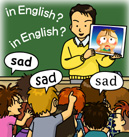先生って?
What about the teachers?
| |

|
英語を教えるはずじゃあ・・・ |
意見A:日本の小学校の先生は、すごいなぁと思う。体育、音楽、算数、国語…何から何まですべて教えてしまうから。だけれども、中には「英語が嫌いだから小学校の先生になったのに、その嫌いな英語を教えなければならないの?」と悲痛な叫びを上げている先生もいる。自信のない科目をいやいやながら教える先生も気の毒なら、その先生に習う子供も気の毒だ。
Comment A:
I admire elementary school teachers in Japan. They teach everything alone - P.E., music, math, Japanese, everything! But you have to remember that some teachers become elementary school teachers so they don't have to teach English. So making English compulsory would be a pity for the teachers - and for the kids as well.
意見B:英語教育のために年間一人500万円という莫大な費用をかけて英語圏からALT(Assistant Language Teacher)を呼ぶわけだ。しかし、本当に満足して帰国するALTはどれだけいるのだろうか。この費用を日本の先生にあてて、海外研修をさせてもいいのではないだろうか。先生自身に、異国でのカルチャーショックが必要だと思う。
Comment B:
About ¥5 million is spent on assistant language teachers (ALT) from English-speaking countries each year. Yet how many of these teachers return to their countries satisfied that they have done their job right? Isn't it worth investing sum of that money into training Japanese teachers abroad? Teachers here need the "culture shock" of studying abroad.
意見C:先生が立派な英語を話す必要はない。ALTと一生懸命会話をしようと試みているその姿こそ、大事。そこに生徒は刺激されるのだから。
Comment C:
Teachers don't have to speak English fluently. They need to try and communicate with ALTs, which will in turn inspire the students.
◆
<課題-6つの重要な点 - Six important points>
1. 目標の明確化と具体化 - Clarification of goals
意見A:コミュニケーション能力の習得は、目標として不明りょうだと思います。
Comment A:
To improve communication skills is unclear as a goal.
意見B:まるで世間の声に流されて、『小学校での英語教育は当然』であるかのように、英語の授業が始まってしまうのは怖いです。
Comment B:
What scares me is the idea that English will be made compulsory in elementary schools because everyone just takes it for granted that that's the best idea.
2. カリキュラムの基準化と柔軟化 - Standardization and flexibility of curriculum
| |
 |
|
先生はALTと研修に参加しよう |
意見A:これに気を付けないと、子供たちの学力に差が出てくると思います。のちのち深刻な問題になるのではないでしょうか。
CommentA:
If we don't take this into account, we'll be faced with a growing gap in student ability, and this may cause some serious problems in the future.
3. 教員養成の十分な支援体制が必要 -Teacher training
意見A:もっとも大事なことです! 英語の基礎力を高める研修が必要です。
Comment A:
This is the most important thing. Teachers must undergo more training in basic English ability.
意見B:ALT と一緒に研修を受けるべきだと思います。
Comment B: They should be taught by ALTs.
意見C:韓国では、海外で教師が研修を受けることもあるようです。教師は異文化ショックを(特にアジアで)受けるべきではないでしょうか。
Comment C: In South Korea, teachers are taking training courses in foreign countries. They realize that their teachers need the experience of studying abroad.
4. 日本の実情にあった独自の早期外国語教授法の構築 - Teaching methods that are appropriate to Japan
意見:欧米からのものが、必ずしも日本に合うとは限らないと思います。自分たちの文化にあった指導法が大切で、英語だからといって何も特別な指導法でなくてもよいと思います。
Comment:
Western teaching method are not necessarily the best method for Japan. The method we end up adopting must fit out culture, and I don't think we should teach English in any way differently to the way other subjects are taught here.
5. 評価の問題 - Assessment
意見A:必要。きちんとしたデータを中学校に持っていくために。ただ、そのやり方がキーポイントとなる。従来のペーパーのみでは、よしとされないだろう。
Comment A:
It's necessary to present each junior high student with correct data. The key point is how to do that. Written assessment isn't enough.
意見B:教室観察による、パフォーマンス評価がされていることが必要だと思う。
Comment B:
We have to see how the students participate in class.
| |

|
|
| 小・中の教師間でミーティングを開こう |
6. 中学校との連携 - Connecting with junior high school teachers
意見A:中学校の先生と小学校の先生が顔をあわせる機会が必要。現場では、ほとんどそれがなされていません。
Comment A:
Elementary school teachers should meet with junior high school teachers to discuss problems. In reality, this does not happen often.
※ 筆者のコメント:この点、台湾では教師同士の議論の場が多く設けられ、その現場の声が教科書に反映され、柔軟に対応がなされているそうです。この点は、将来「台湾編」を特集する際にご紹介できたらと思います。
Writer's comment: In Taiwan, it's been done and the discussions are reflected in the contents of the textbooks. For ore details, see Kids English (Taiwan)
意見B:英語を小学校で教科とするとなると、小学校から大学まで、英語教育を再構築しなければならない。ということは、教育全体を見直す必要があると思います。
Comment B:
If English becomes a compulsory subject at elementary schools, you have to re-think the whole system of English education — from elementary school to university.
| |

|
|
| 小学校では英語で遊ぶことが中心 |
意見C:小学校で歌や遊びといった英語学習をしてきた子どもが、中学校に入ると突然机の上での勉強になる。そのギャップに悩んだり、結局英語を嫌いになる子どもが増えるのではないでしょうか。これ以上、英語嫌いの子どもを増えると思うと、怖いです。
Comment C:
The kids might hate English in junior high school — because of the gap in the way English is taught in elementary school and junior high school.
※筆者のコメント:実際、韓国では、これが社会問題となっているといわれています。このあたりも、韓国編を特集する際に取り上げたいと思います。
Writer's comment: Actually, this is one problem that's evident in South Korea. For more details, see Kids English (South Korea).
意見D:教師も自分たちで教科書やカリキュラムを作るべきだと思います。
Comment D:
The textbooks/curriculum should be created by the teachers themselves.
☆★編集後記☆★
| |

|
|
|
|
| すべては子供たちのために |
現場の話を聞いてみて、「検討に時間がかかるのは、過去のデータがないためだ。失敗が許されないからこそ、時間が必要だ」という文部科学省の方のコメントが印象的でした。また、発音の問題(発音だけが良くても駄目だろう)や国際理解の根幹にあるもの―「アイデンティティーとは?」―などについてさまざまな議論がなされており、実り多い機会になりました。
"So why does it take so much time to bring English into the elementary school curriculum? It's because we don't have enough data from the past. We can't allow for mistakes, so that's why we need more time." So says the Ministry of Education.
「教師が教えることに手いっぱいになると、生徒は授業を楽しめない」という先生の声には納得。ある程度の余裕って大切ですよね。「まるで世間の声に流されて、『小学校での英語教育は当然』であるかのように、英語の授業が始まってしまうのは怖い」という先生の声はごもっともだと思いました。ほかの国がやっているから日本も!ではなく、今、なぜ小学校で英語が必要なのか、またその必要はないのではないか、という意見にも耳を傾けることが必要だと思います。
"If the teachers are so busy worrying about how to teach their class, the students won't enjoy themselves." I agree. It's important to give it some time. I agree with the earlier comment that it's a terrifying idea that English education will be introduced into the elementary school curriculum just because other countries are doing the same thing. We need to first ask ourselves: is English necessary in elementary school?
今回取り上げられなかった内容もあるため、また別の機会でご紹介できたらと思います。
The rest of the discussion will be featured on another occasion.
